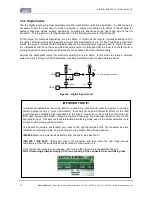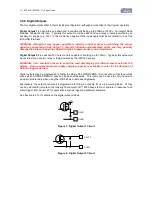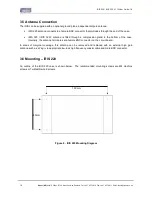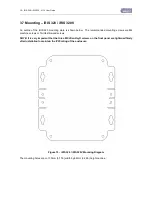
iRIS 220 / iRIS 320, V1.19 User Guide - 28
28
iQuest (NZ) Ltd - PO Box 15169, Hamilton, New Zealand Tel: +64 7 857-0810 Fax: +64 7 857-0811 Email: iquest@iquest.co.nz
Option 5
When this option is selected you will be prompted to enter an IP address to use for socket B. Socket B is the
socket that is used by the iRIS for System DO
(binary) communication. This is the destination IP address
used for unsolicited binary calls.
> Skt B IP=
Option 6
When this option is selected you will be prompted to enter a port number to use for socket B.
> Skt B Port=
Enter the remote port number that you want to have System DO
messages delivered to by default (e.g.
7777). For the iQuest Data Network use port 7779 or port 7780 unless advised otherwise by iQuest.
Option 7
Select this option to display the IP Acceptance set-up menu.
Option 8
Select this option to display the GPRS/CDMA-1X Schedule configuration menu.
Option 9
Select this option to display the current network settings (GPRS only) or the wireless module identification
parameters. Example information for both GPRS and CDMA variants is as follows:
GPRS
IMSI: 530011100721422
IMEI: 355435000001213
L/C: 0005,143F
LOC: 5
TWR: 18
ANT: 3
RSSI: 19,00
IMSI:
International Mobile Subscriber Information. This is derived from the SIM card
IMEI:
International Mobile Equipment Identifier. This is stored in the GPRS module by iQuest during initial
calibration and setup of the iRIS and uniquely identifies the hardware by manufacturer and serial
number.
L/C:
Location/Cell string. This is the exact cell identification string as received from the GPRS module.
This is processed by the iRIS, which extracts and displays in the information in the next three
parameters. The exact nature of these may vary depending on the country and network provider.
LOC: The Location ID of the cell that the iRIS is registered with.
TWR: The Tower ID of the cell that the iRIS is registered with.
ANT:
The Antenna ID of the cell that the iRIS is registered with.
RSSI: This displays the Received Signal Strength Indication (RSSI) followed by the Bit Error Rate (BER).
This is useful for determining the strength and quality of the signal. The possible range of values for
RSSI is 0-31, with 31 being very strong. A value of 99 indicates that the RSSI value is not available.
The iRIS will not attempt to connect to the network if the RSSI is less than six.
The BER gives an indication of the signal’s quality. Zero is the best (lowest error rate).
CDMA
ESN: ABC123
MDN: 12345678901234
RSSI: 19
ESN:
Electronic Serial Number. This uniquely identifies the wireless module on the network.
MDN: Mobile Data Number. The service provider issues this and is the number used to call the module and
also identify it on incoming or outgoing SMS text messages.
RSSI: This displays the Received Signal Strength Indication (RSSI). Note, unlike the GPRS version, the
CDMA version does not display a BER (Bit Error Rate) parameter.
















































